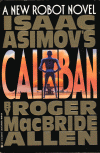This book was my first experience with writing by Kurt Vonnegut. His writing, at least in this book, is very original and unconventional. The “Timequake” according to the dust jacket is an event where on February 13th, 2001, everyone is thrust back to February 17th, 1991. Vonnegut treats this as a contraction of the Universe, not simply time travel in the traditional sense. In many time travel stories, the characters look for ways “to put right what once went wrong,” a la Quantum Leap. Vonnegut doesn’t give the characters in this story that opportunity. Everyone is forced to live their lives on autopilot, doing the exact same things they did before, but with the knowledge of what was to come.
I found this angle quite troubling at first, because how boring would it be to have to live almost 10 years all over again without free will? Vonnegut does quite a bit with it by adding a few more twists. In the prologue, he explains that one of the main characters, Kilgore Trout, is his alter ego. Apparently, this character shows up quite a bit in his writing, however in this book, Vonnegut is a character as well. To top it off, the book supposedly started out as a first draft that was scrapped then rewritten to be finished in the final form. I’m not certain if that really happened, or was just part of the book. Confusing right? He covers this in the prologue under the guise of explanation, but looking back I think it was just a successful attempt to keep me off balance.
The final part of the book is about what happens when free will kicks back in. Can you imagine being a puppet with yourself as the puppet master suddenly able to do whatever you want? Kilgore Trout is one of the few, if not only, people that can cope with the situation. Most people freeze up, not able to decide what to do next. So that is the basic plot of the book, all laid out on the dust jacket and the first couple pages that make up the prologue. What is the point of reading it then? For me, the story really didn’t seem to be the focus of this book. It was just a framework for Vonnegut to use as a way to talk about random topics ranging from why semicolons suck, how electronic books don’t measure up to physical ones, or why Chicago is better than New York.
A lot of these observations are just thrown in randomly, confirming my belief that Vonnegut’s goal is to keep the reader off balance. For example, chapter 43 begins with this:
Question: What is the white stuff in bird poop?
Answer: That is bird poop, too.
With himself as a character, the lines between fiction and real life were sufficiently blurred. I really didn’t know much about Vonnegut, so I found myself looking researching at random points to see what was fiction or what was real. The other characters were interesting as well, but I found myself fascinated by how Vonnegut used Trout poke fun at himself. I didn’t realize until writing this review that this was actually the last fiction novel written by Vonnegut. I’m not sure that was the best way to get exposed to a new author, but I’m definitely interested in reading more by him, so it worked out for the best after all. I enjoyed this book, and would highly recommend it. If you’ve never read anything by Vonnegut, it wouldn’t hurt to start with this one.





It’s been a long time since I read this book. Now I think maybe I should re-read it. But I do know that anything Vonnegut writes is wonderful.
If you liked this, I recommend delving in to some of Vonnegut’s other works with this great collection of short stories: http://en.wikipedia.org/wiki/Welcome_to_the_Monkey_House